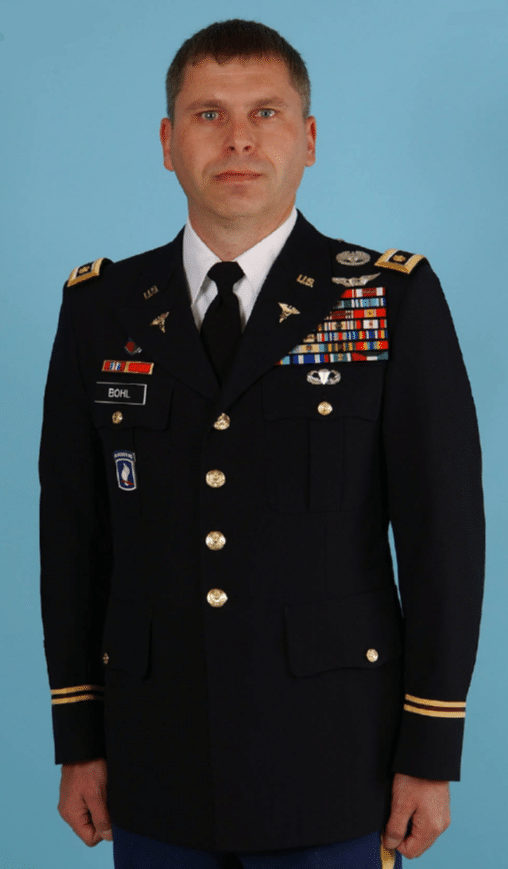What inspired you to serve?
When I was young, I was inspired by those who served in the Armed Forces. As a young lad, I accompanied my father, a veteran of the Vietnam era, as I played taps on my trumpet for the many who had fallen during Memorial Day. It was a special time for me to feel the camaraderie from the American Legion former service men and women and to hear their stories first-hand.
I told my father when I was about 13 years old that I had made it a personal goal to join the American Legion one day. He reminded me that a pre-requisite to joining the American Legion is to have served as a veteran during wartime. I knew that sometime in my life, I was destined to join the military to complete my personal goal. Later on, in life, I would complete that goal by joining the Army.

In which branch did you serve, how long did you serve (from when to when), and what was your rank?
I originally joined the Army Reserves in April of 1989 to start my military career while I completed college. Unbeknownst to me, soon after I completed my initial military training in March of 1990, I was activated for Desert Shield/Storm and sent to Southwest Asia. I found myself in a combat zone while maturing and understanding what it means to serve in the military. I loved the service and became focused on becoming a medical provider. After the Gulf War ended, I decided to pursue that dream while completing the goal of joining the American Legion. I decided to return to school to become a doctor. While I was studying Biology, I learned of a different way to be a medical provider as a Physician Assistant.
What do you remember that was most challenging during your military experience?
I tried to cram three semesters of upper graduate studies into two semesters and quickly realized that isn’t a reality. So, in January of 1993, I enlisted for Active Duty in the medical field. I worked hard to advance both militarily and educationally in my field and soon was selected for Physician’s Assistant Schooling which would promote me toward the officer ranks. This was a very difficult school. In essence, we learned the first two years of medical school within our first year, taking an exam almost every other day for the first year. After graduation, I felt I had the necessary education but in reality, was green, not really knowing what I needed to know. If you ever watched the TV show MASH, there is an episode where the young general surgeon fresh out of residency, felt like an intern as he was the underdog as compared to seasoned veteran surgeons who had been in the theater for years. That was the first time I became appreciative of the phrase “you don’t know what you don’t know”. I diligently worked to be the best Physician Assistant I could, not for me, but for the soldiers in my care. I deployed three times (Operation Iraqi Freedom I-the invasion, Operation Iraqi Freedom II/III, Operation Enduring Freedom (Afghanistan)) and each time I strived to become a better provider.
To be honest, each traumatic situation was different in its own way, and I still remember each like it was yesterday. Those memories never fade and each soldier that took his or her last breathe in my care I will remember till the day that I die. Recounting MASH once again, there is an episode where Hawkeye has a childhood friend that dies in his care. I distinctly remember the scene whereby the commander, LTC Blake, says to Hawkeye, “There are two things they told me in Command School. Rule number 1, in war, men die. Rule number 2, Doctors can’t stop rule number one.” It is one thing to perform medical procedures on someone whom you don’t know in an effort to save their life. It is a totally different situation when the person on the table is a good friend of yours and succumbs to death despite your skills and education not being able to stop the inevitable dreadful outcome. I will tell you that as I write this, tears flow down my face as if it was yesterday. That is the reason when I retired from the United States Army as a Major, I retired from medicine. To be frank, I have seen more trauma and people die or hurt from wartime injuries in four deployments and a total of 26 years of service than most trauma surgeons.
What did you enjoy the most after your military service?
I recently watched a biography of GEN Douglas MacArthur. In the end this brilliant general, wartime hero, and Medal of Honor recipient addressed Congress saying, “Old Soldiers never die, they just fade away. And like the old soldier of that ballad, I now close my military career and just fade away, an old soldier who tried to do his duty as God gave him the light to see that duty. Good-bye”.
I found that quote very in tune to my own feeling. Not that I am even close to a military figure such as GEN MacArthur. But the feelings are much the same. I retired from the Army knowing that I gave my all, and through the grace of God, am alive to write this today, while other fellow Soldiers fought harder and are buried today for our remembrance of their sacrifice of their own life for our freedom. You see, it doesn’t matter whether you are a war hero or whether you just did your duty for the few years that you served or you retired. As the saying goes “All gave some and some gave All”.
This Memorial Day weekend let us remember those who fought and died for our freedom as this holiday intended. It is in those that we should honor and cherish forever. God Bless. AIRBORNE!
Thank you to Anthony Bohl, (U.S. Army veteran, Major ret.), for sharing his story and to all veterans who have served this country, past and present.
.jpg)
%20(1).png)
-3.jpg)

-Dec-16-2025-08-31-35-5224-PM.jpg)
